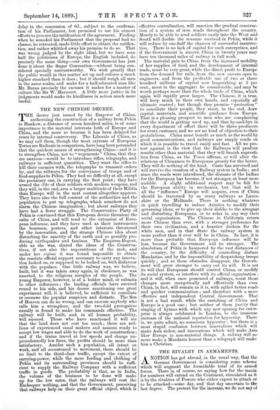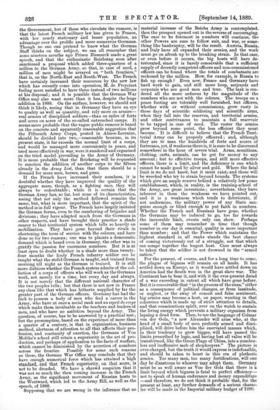Lift RIVALRY IN ARMAMENTS.
ANOTION has got abroad, in the usual way, that the German Government is considering some scheme which will augment the formidable total of its armed forces. There is, of course, no saying how far the mania for numbers will extend on the Continent, stimulated as it is by the rivalries of Powers who either expect to attack or to be attacked—some day, and that day uncertain to the last degree. The pretext for the increase, we do not say of the Government, but of those who circulate the rumour, is that the latest French military law has given to France, with her nearly stationary and lesser population, an advantage over the prolific and more numerous Germans. Though no one can pretend to know what the German Staff thinks on the subject, we can all remember that some nineteen months ago Prince Bismarck made a great speech, and that the enthusiastic Reichstag soon after sanctioned a proposal which added three-quarters of a million to the German Army, so that, in case of need, a million of men might be arrayed on " both frontiers," that is, on the North-East and South-West. The French have certainly increased their resources by the new law which has recently come into operation, M. de Freycinet feeling more satisfied to have three instead of two millions at his disposal ; and it is possible that the German War Office may also want more than it has, despite the huge addition in 1888. On the surface, however, we should not think it likely, seeing that in Germany they have an eye to quality as well as quantity, and rely more on armies— real armies of disciplined soldiers—than on miles of forts and acres on acres of the so-called entrenched camps. It seems more probable that the vague public rumour is based on the concrete and apparently reasonable suggestion that the Fifteenth Army Corps, posted in Alsace-Lorraine, should be divided into two,—reasonable because, in its present state, it far exceeds the normal limit of a corps, and would be managed more conveniently in peace, and used more effectively in war, were it sundered and organised on the tried model prevailing in the Army of Germany. It is more probable that the Reichstag will be requested to sanction the addition of another corps to the fifteen already in the Army List, than that there should be a demand for more men, horses, and guns.
If the French have increased their numbers, it is doubtful whether they have improved the quality of the aggregate mass, though, as a fighting race, they will always be redoubtable ; while it is certain that the German Army has, so far, lost none of its characteristics, seeing that not only the method followed remains the same, but, what is more important, that the spirit of the method is in full vigour. The French have largely imitated the German forms, even to the numbering of brigades and .divisions ; they have adapted much from the Germans in _other respects, and have brought their practice a shade _nearer to that territorial system which tells so heavily on __mobilisation. They have gone beyond their rivals in .shortening the term of service with the colours, and have done so for two reasons ; one was to placate a democratic demand which is heard even in Germany, the other was to _gratify the passion for enormous numbers. But it is at .least open to doubt whether in a shade more than twenty- .four months the lively French infantry soldier can be .taught what the stolid German is taught, and trained from morning till night as the German is trained. It is still more dubious whether the French system admits of the col- lection of a corps of officers who will work as the Germans work, not merely for a time, but every day and always. It is not merely that the different national character of the two peoples tells ; but that there is not now in France any class like that which has hitherto supplied by far the greater part of the German officers. Germany has had the luck to possess a body of men who find a career in the Army, who have at once a social rank and an esprit de corps which make them invaluable as the teachers and leaders of men, and who have no ambition beyond the Army. The question, of course, has to be answered by a practical test; but the presumption, based on the experience of more than a quarter of a century, is that in organisation, business method, alertness of attention to all that affects their pro- fession, and continuity of exertion, the Germans of Von _JSIoltke's school still retain a superiority in the art of pro- duction, and perhaps of application to the facts of warfare, -which cannot be diminished by the accretion of numbers across the frontier. Possibly for some such reasons as these, the German War Office may conclude that they have enough numerical force which has attained a 'high standard, and that French superiority, on that score, is not to be dreaded. We have a shrewd suspicion that it was not so much the then coming increase in the French Army, as the significant movement of Russian hosts to the Westward, which led to the Army Bill, as well as.the speech, of 1888. Supposing that we are wrong in the inference that no material increase of the Reichs Army is contemplated, then the prospect opened out is the reverse of encouraging. The race to be foremost in numbers -*ill continue, the other Powers are sure to follow suit, and war, or some- thing like bankruptcy, will be the result. Austria, Russia, and Italy have all expanded their armies, and the work must go on afresh up to the breaking strain. In that case, or even before it occurs, the big hosts will have de- teriorated, since it is barely conceivable that a sufficient supply of decently competent officers and non-commissioned officers can be found where the totals of combatants are reckoned by the million. How, for example, is Russia to fish up enough ? Even now, France and Germany have hard work to gain, and still more keep, serjeants and corporals who are good men and true. The task is ren- dered all the more arduous by the magnitude of the numbers who are not with the colours. The troops on a peace footing are tolerably well furnished, but officers, whether with or without commissions, grow rusty in these days of scientific soldiering and scientific arms, when they fall into the reserves, and territorial armies, and other contrivances to maintain a full reservoir to be tapped in case of need. The vaster the armies grow beyond some point, the less efficient they must become. It is difficult to believe that the French Terri- torial Army can be properly officered ; and, although they are to man the hundreds of forts and scores of fortresses, yet, if weakness there is, it is sure to be discovered somewhere in the hour of severe trial. Arms, munitions, clothing, carts, animals, can be got for money to any amount ; but to effective troops, and still more effective officers, there is a limit, and the deficiency is one which cannot be made good by silver and gold. Where the fatal limit is we do not know, but it must exist,- and those will be wrecked who try to strain beyond. bounds. The systems which give an ample reserve behind a relatively low peace establishment, which, in reality, is the training-school of the Army, are great inventions ; nevertheless, they have inherent in them the weakness we have pointed out, and it is a weakness which tends to deteriorate, if not undermine, the military power of any State san- guine enough or blind enough to put faith in numbers. Whether the French and Russians have gone, whether the Germans may be induced to go, too far towards the inexorable limit, events only can show. Perhaps some of them may remember in time that though number in our day is essential, quality is more important than number ; and that the Power which maintains the highest standard in all ranks stands the best chance of coming victoriously out of a struggle, not that which can scrape together the hugest host. Care must always be taken that the soldier is not drowned in the " armed nation."
For the present, of course, and for a long time to come, the plague of bigness will remain on all lands. It has settled down on Europe, as it would have settled down on America had the South won in the great slave war. The Continent has to bear it, and with it the ever-present dread of a war exceeding in extent all which have gone before. But it is conceivable that " in the process of the suns," either as a consequence of political changes, or from lassitude, or neglect, or the sway of conceit and false sentiment, big armies may become a host, on paper, wanting in that coherence which is made up of strict attention to details, and that conscientious spirit, ever on the watch to sustain the living energy which prevents a military organism from lapsing a dead form. Then, to use the language of Colmar von der Golz, " a new Alexander will arise who, at the head of a small body of men perfectly armed and disci- plined, will drive before him the enervated masses which, in their tendency to grow bigger, will have passed the limits prescribed by logic, and having lost all value will be transformed, like the Green Flags of China, into a number- less and inoffensive mob of shopkeepers." The picture is over-charged, but the truth it would express is indefeasible, and should be taken to heart in this era of plethoric armies. Too many men, too many fortifications, will one day be disastrous to whoever may adopt them. Germany must be as well aware as Von der Golz that there is a limit beyond which bigness is fatal to perfect efficiency— not to speak of human endurance and money expenditure —and therefore, we do not think it probable that, for the present at least, any further demands of a serious charac- ter will be made in the Imperial military budget of 1890.



































 Previous page
Previous page